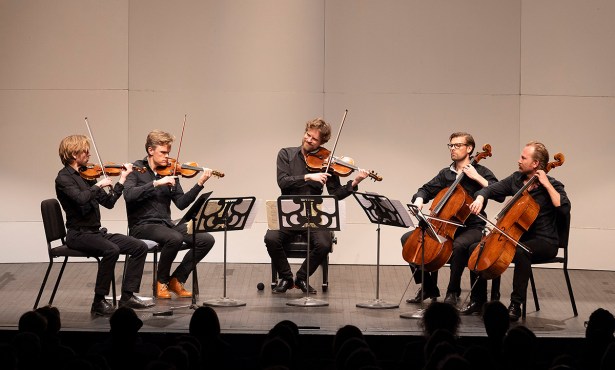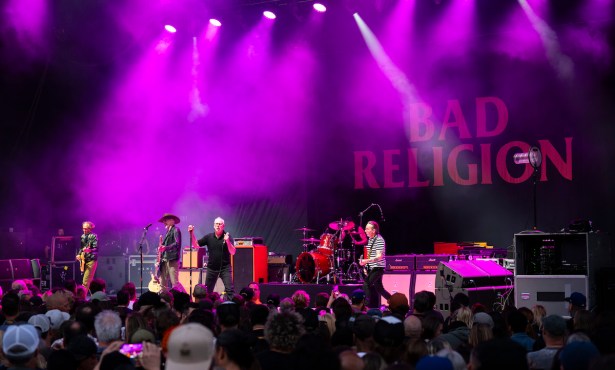Robin Cox Ensemble at Center Stage
The Many Faces of Minimalism
Robin Cox is a man of many hats-composer, violinist, bandleader, Internet radio programmer, and impresario among them. On Sunday night at Center Stage, Cox manned his fiddle and led his long-standing ensemble, and the concert served as a tidy lesson in the history of minimalism, a pillar in Cox’s work. Any minimalist history lesson should include reference to that seminal “greatest hit,” Terry Riley’s deceptively simple 1964 piece In C. Its mobile assembly of interlocking and adjustable parts, in varying relationships to the constant eighth-note tolling of Cs, proved well-suited to this ensemble, with two mallet percussionists (Erik Leckrone and Eric Mellencamp), cello (Maggie Parkins, also heard recently in the Eclipse Quartet), clarinets (Marty Walker), and violin more or less in the center.
Fast forward to the present chapter of the minimalist adventure-the third or fourth chapter-and Cox’s own compositional ideas on the subject shone and shimmied. The concert opened with Cox’s Square Feet, a propulsive and rhythmically restless syncopated piece in which four musicians stick to the score’s roadmap while percussionist Leckrone improvises on shekere and bodhran. Similar paradoxes of tonality and rhythmic structure were offered by Cox’s older piece Escher and the new Levitation Games. The latter, also featuring guest musician Scott Deal-down from Alaska-conveyed a pleasing, emotionally bittersweet harmonic atmosphere, hovering between tonal homes and inventively locked into the steady pulse of the post-minimalist mindset.
Deal’s Coccolithophore, a duet with the composer-percussionist and Leckrone plus ghostly taped parts, evoked the ubiquitous oceanic plant life of its mouthful title. It is a work of oscillating rhythmic dimensionality, simultaneously loose and rigorous by design. The evening’s rhythmic imperative did subside briefly, for Belinda Reynolds’s lovely and elegiac post-9/11 meditation, DUST, for clarinet and cello.
In a gesture of continuity, Cox also reprised Outerborough, an audio-video piece presented by N.Y.C. violinist Todd Reynolds in his Iridian-sponsored concert at CAF in January. Bill Morrison’s beguiling twin-screen visual of 1899 film footage, tracing the hypnotic progress of a tram over the Brooklyn Bridge, was the sensory seed for Reynold’s piece. Its enigmatic mix of live and taped layered violins-plus the occasional kick drum thud-naturally reminds us of Steve Reich’s Different Trains, but is yet again a different minimalist-train song in which the dualities of vintage/modern technologies and synchronous motion take us on a heady little trip.



